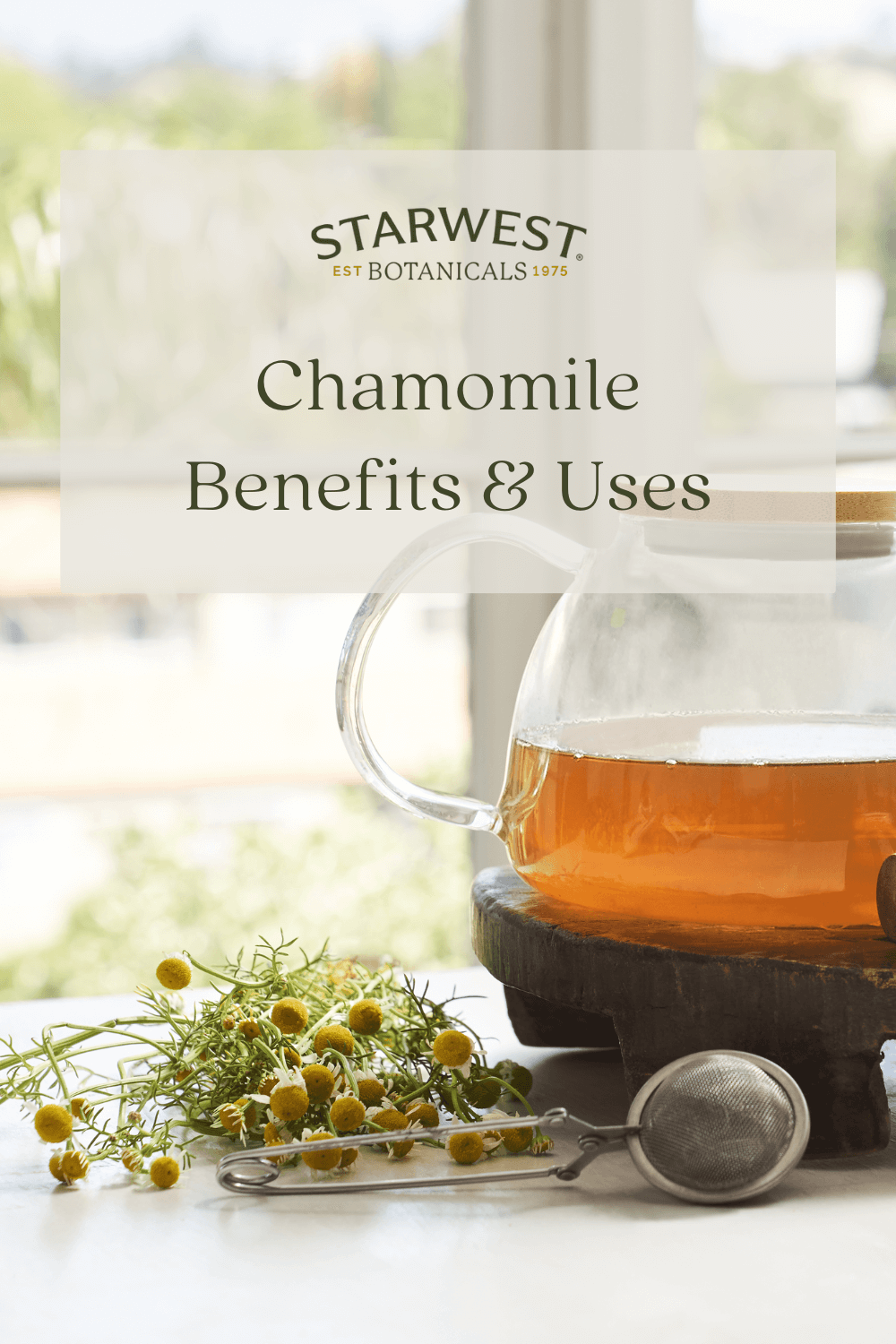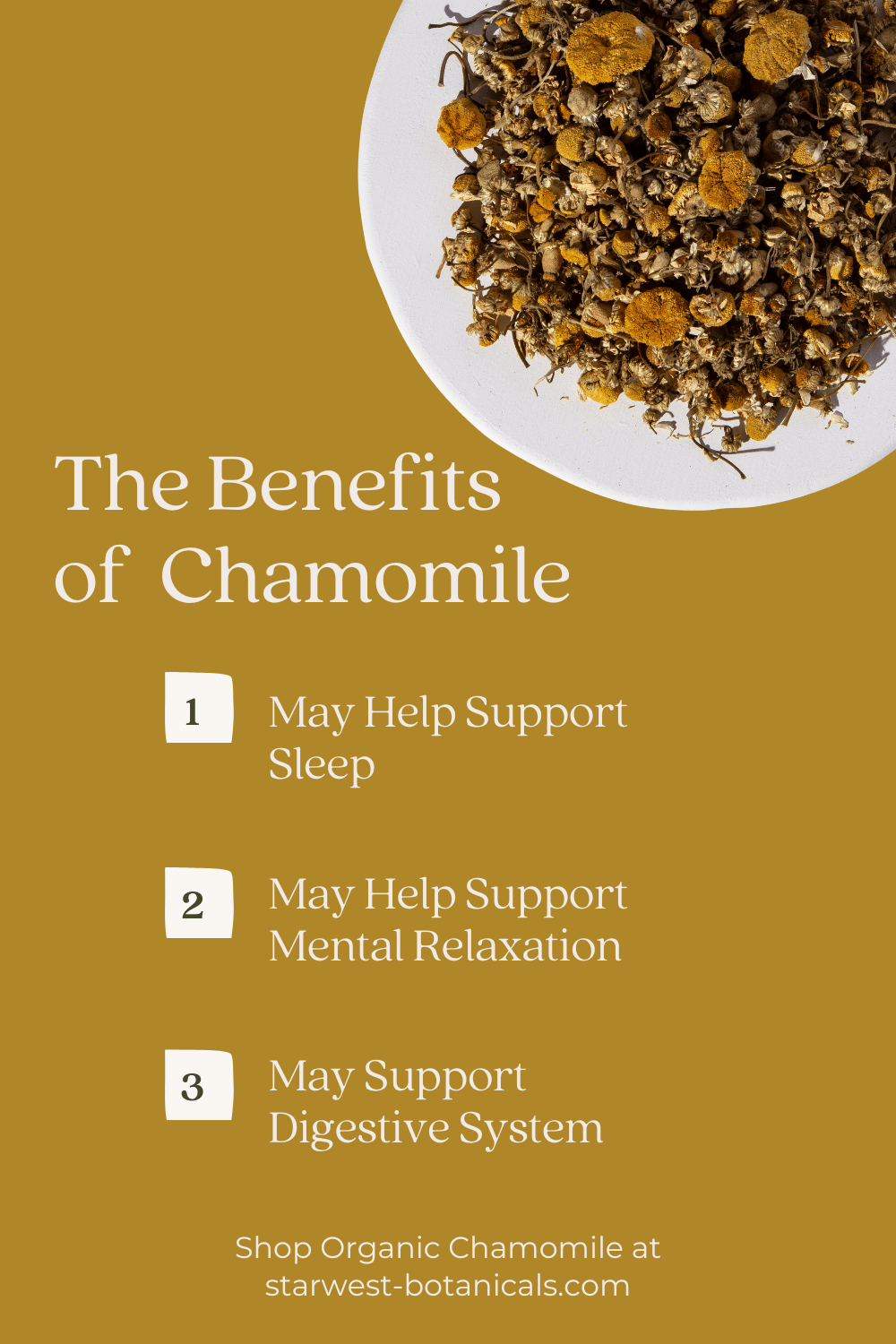Chamomile Benefits & Uses | Starwest Botanicals
Posted by Daniel Powers on 04-07-2023

Chamomile is a soothing herb that has been used for centuries to help relax the body and mind.
One of the main benefits of chamomile is its potentially relaxing effect on the body, which may make it helpful for getting a good night's rest.
Studies have shown that chamomile has a variety of health benefits, including for stress support, sleep quality, and digestive health. As a bonus, chamomile tea also has an amazing flavor!
By the end of this article, you will know the remarkable health benefits of chamomile and how to add this herb to your daily routine.
What is Chamomile?
Chamomile is part of the Asteraceae family (i.e. daisy) family of plants. Originally found in Europe and Asia, chamomile can now be found growing throughout the globe.
There are a few different types of chamomile, including German Chamomile (Matricaria recutita) and Roman Chamomile (Chamaemelum mobile). Both varieties can be used interchangeably, but it's noted that German chamomile is preferred. Roman chamomile may not provide as strong of a relaxation effect, it also has more of a bitter taste, which is off-putting for some individuals.
Chamomile plants consist of small daisy-like flowers atop tall stems. The flower tops are the medicinal part of the plant. They are typically harvested throughout the summer months.
Chamomile is rich in various plant compounds, including sesquiterpene lactones and flavonoids. It's thought that these phytochemicals help to provide the various benefits of chamomile.
From a traditional medicine perspective, german chamomile was said to have a calming effect on the mind and body. As a hot water infusion (i.e. a strong tea), chamomile has been used to help promote relaxation and support digestion.
Chamomile was also used topically to help support wound healing.
While chamomile has a long history of traditional use as an herbal remedy, modern research is just starting to establish its various health benefits.

Potential Health Benefits of Chamomile:
There are many purported ways that chamomile may help to benefit health.
However, it should be noted that there are only a handful of human clinical trials.
1. May Help To Support Sleep
Getting deep, restful sleep is important for overall health and wellness. With our current fast-paced lifestyles, oftentimes sleep is one of the first things that gets sacrificed.
Chamomile is known to be a calming herb that may help to relax the mind and body. Research suggests that it may be helpful in improving sleep quality and occasional sleeplessness.
One clinical trial found that consuming german chamomile helped to improve sleep quality in postnatal women. The participants also noted that it helped to support mental health and relaxation.
Another study found that supplementing with chamomile extract helped to improve sleep in elderly individuals.
This is in line with the age-old tradition of drinking a drink of a cup of chamomile tea before bedtime to help support better sleep.
2. May Help To Support Mental Relaxation
Chamomile has been used for centuries to promote mental relaxation. In traditional medicine, it was thought to balance the "spirit".
A 3-month study found that taking chamomile capsules daily helped to support mental health and stress resilience. There were minimal side effects reported in the study, which lead the researchers to the conclusion that long-term use of chamomile may be beneficial for most individuals.
In a 2-month trial, chamomile demonstrated “statistically significant and clinically meaningful” improvements in mental relaxation.
If you are looking to relax your mind, consider trying chamomile!
3. May Support The Digestive System
Chamomile has been used as a natural digestive aid by traditional herbalists. Its bitter constituents are said to help aid sluggish digestive systems.
This traditional usage was confirmed by modern researchers that found that chamomile may help to support digestive health in mice.
Chamomile is thought to support digestion by helping to relax the smooth muscles of the digestive system. This may help to promote regularity and ease occasional abdominal discomforts, often associated with indigestion.
How To Add Chamomile To Your Diet:
Based on the health benefits listed above, adding chamomile to your diet is an easy decision - especially if you're looking to help your body and mind to relax.
So what's the best way to add chamomile to your diet?
The best way to incorporate chamomile into your diet is by drinking chamomile tea. It tastes great and may help to prepare your body for a full night of sleep.
At Starwest Botanicals, we have a variety of different types of chamomile available for purchase, including:
- Chamomile Flowers
- Organic Chamomile Flowers
- Organic Chamomile Flowers (Egypt)
- Chamomile Flower Extract
- Chamomile Essential Oil
Typically dried chamomile flowers are boiled with water to make tea before bed.
However, as noted above, we offer a chamomile flower extract, which allows you to get a concentrated form of chamomile in a quick, convenient dose.
Is Chamomile Safe?
The Botanical Safety Handbook, the leading resource on herb safety, rates chamomile as being a generally well-tolerated herb for most individuals.
If you have allergies to plants in the Asteraceae (i.e. daisy) family of plants, use caution prior to using chamomile.
Conclusion:
Chamomile is a generally well-tolerated herb with a wide variety of possible benefits.
Research shows that chamomile may provide many different health benefits, especially for relaxation.
As an added bonus, chamomile flowers are also rich in various plant phytochemicals.
Chamomile is worth considering if you are looking for natural support in any of these areas.
Here at Starwest, we offer a variety of chamomile products. Whether you’re looking for dried chamomile flowers,essential oils, or a done-for-you chamomile flower extract, we have you covered with certified organic chamomile flowers in bulk.
Have you tried chamomile before? What's your favorite way to add this beneficial herb to your diet?
Author Bio:
Daniel has a master's degree in herbal science from the Maryland University of Integrative Health. He's the founder ofThe Botanical Institute, where he writes about the health benefits of herbs.


